Sultan Abdul Aziz Shah Airport
Sultan Abdul Aziz Shah Airport (Malay: Lapangan Terbang Sultan Abdul Aziz Shah), (formerly Subang International Airport/Kuala Lumpur International Airport), often called Subang Airport or Subang Skypark, is an airport located in Subang, Petaling District, Selangor, Malaysia.
Sultan Abdul Aziz Shah Airport Lapangan Terbang Sultan Abdul Aziz Shah | |||||||||||
|---|---|---|---|---|---|---|---|---|---|---|---|
 Exterior view of the newly refurbished Subang skypark terminal from the pavement | |||||||||||
| Summary | |||||||||||
| Airport type | Public | ||||||||||
| Owner | Government of Malaysia | ||||||||||
| Operator | Subang Skypark Sdn Bhd | ||||||||||
| Serves | Klang Valley, West Malaysia | ||||||||||
| Location | Subang, Selangor, Malaysia | ||||||||||
| Hub for | |||||||||||
| Time zone | MST (UTC+08:00) | ||||||||||
| Elevation AMSL | 89 ft / 27 m | ||||||||||
| Coordinates | 03°07′52″N 101°32′53″E | ||||||||||
| Maps | |||||||||||
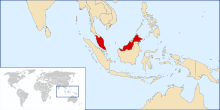 Selangor state in Malaysia | |||||||||||
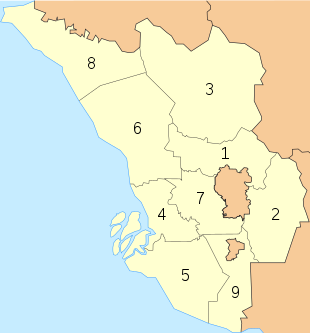 SZB /WMSA  SZB /WMSA SZB /WMSA (Peninsular Malaysia) 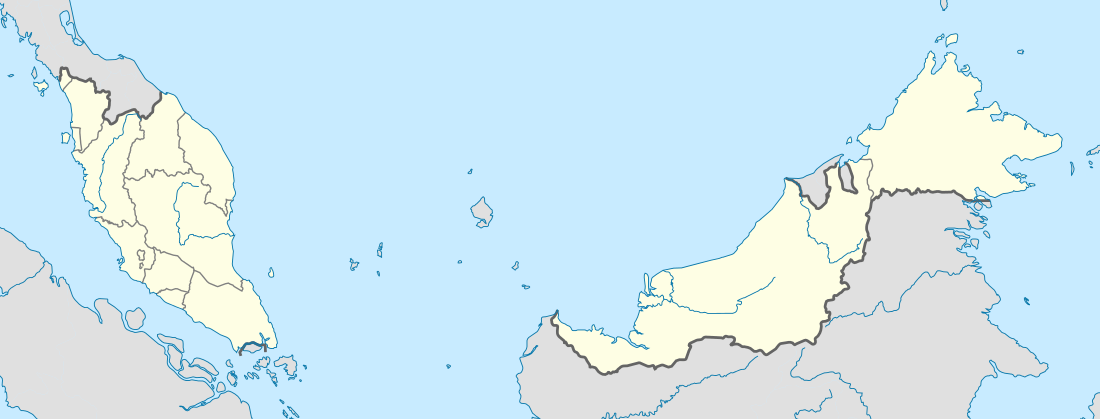 SZB /WMSA SZB /WMSA (Malaysia) 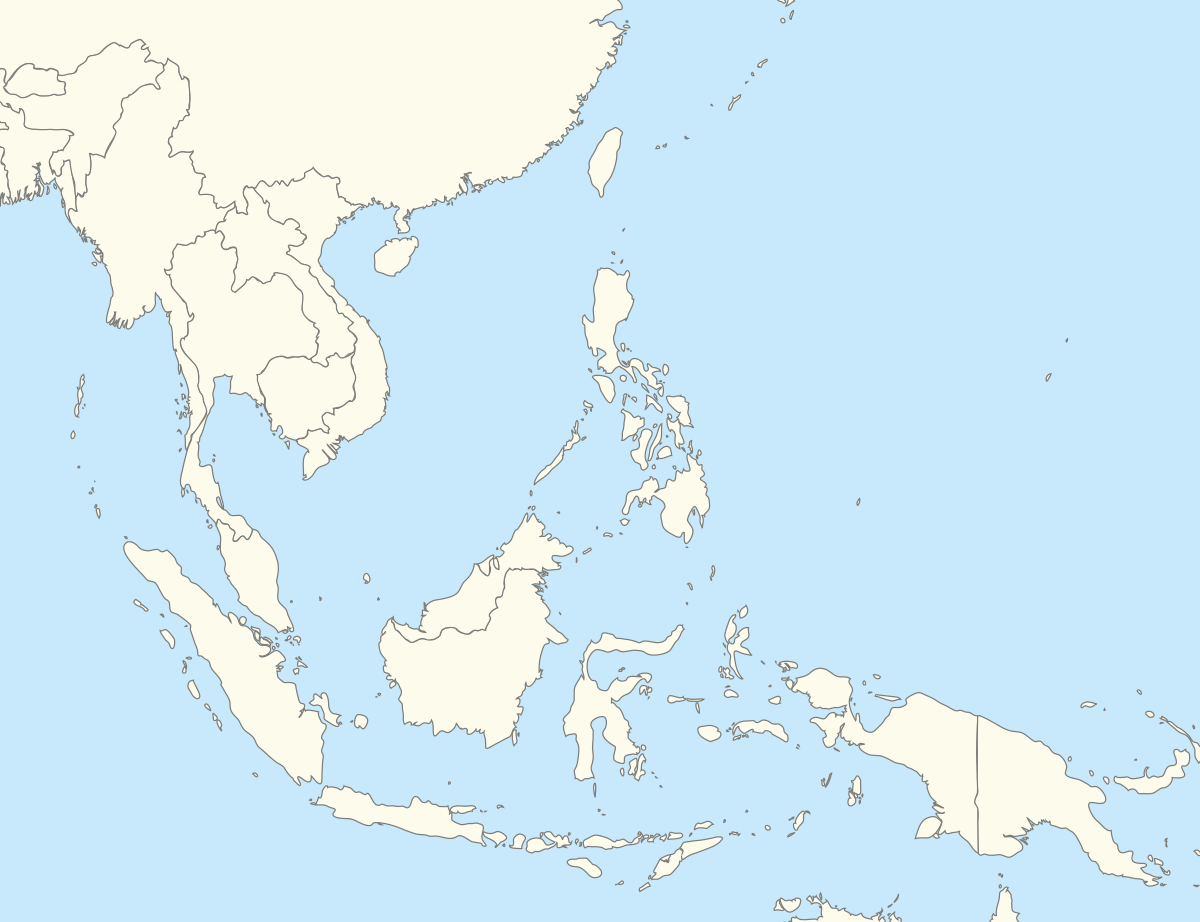 SZB /WMSA SZB /WMSA (Southeast Asia) 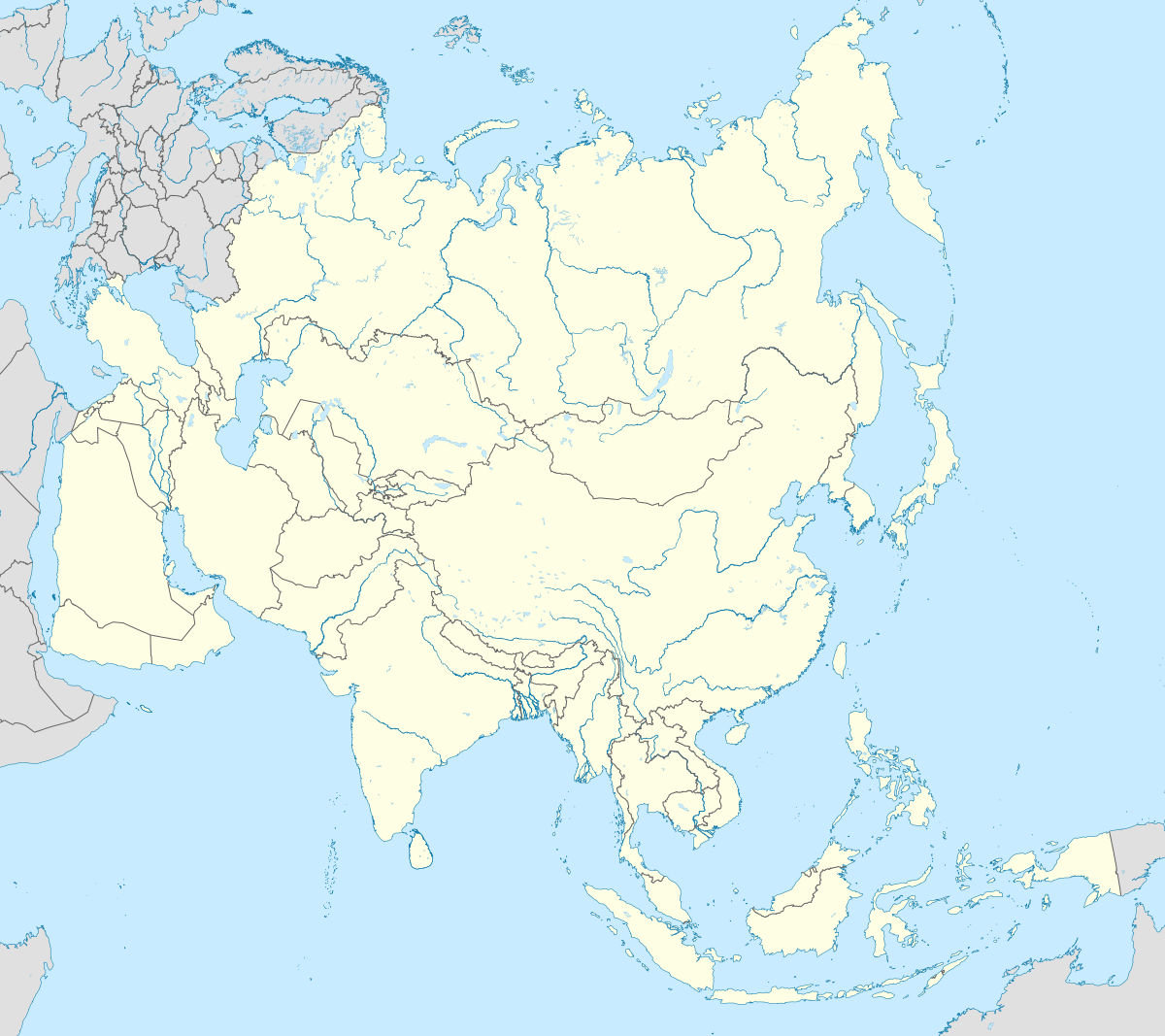 SZB /WMSA SZB /WMSA (Asia) | |||||||||||
| Runways | |||||||||||
| |||||||||||
| Statistics (2018) | |||||||||||
| |||||||||||
Subang International Airport served as Kuala Lumpur's main airport from 1965 to 1998, before the Kuala Lumpur International Airport in Sepang was opened. Although plans existed to convert the airport into a low-cost carrier hub, the change was opposed by Subang Jaya residents. The airport was repurposed to serve general aviation as well as turboprop domestic and international flights. In 1996, the airport was renamed after Sultan Salahuddin Abdul Aziz Shah Al-Haj (Salahuddin of Selangor), the eleventh Yang di-Pertuan Agong of Malaysia and eighth Sultan of Selangor.
Subang Airport is currently the hub for Firefly and Malindo Air commercial turboprop services. Transmile Air Services is the only other non-passenger non-turbo prop aircraft landing and utilising Subang Airport Terminal 2. While heavily opposed by Ara Damansara residents of the noise of the jet engines, Raya Airways still operates out of SZB servicing DHL and other local hubs.
History
Work on the Subang International Airport started in 1961 and finished in 1965 at a cost of $64 million. Its deceptively simple design consisted of a roof composed of floating concrete shells that was held aloft by mushroom-shaped columns. Partners in the Booty Edwards Architectural practice Kington Loo and C.H.R Bailey are typically attributed with the design. The open structure also featured a massive circular ramp, reminiscent of Berthold Lubetkin's penguin pavilion in London. Most of the structure was removed during a major reconstruction in 1983.[3]
The airport was officially opened to traffic on 30 August 1965, and had the longest runway (3.7 km long, 45m wide – runway 15 – 33) in Southeast Asia, replacing Sungai Besi Airport. By the 1990s, the airport had three terminals – Terminal 1 for international flights, Terminal 2 for Singapore – Kuala Lumpur shuttle flights by Singapore Airlines and Malaysia Airlines, and Terminal 3 for domestic flights. Toward the end of service, the airport suffered at least two major fires that forced traffic to be diverted to other airports. By the end of 1997, Subang Airport had handled 15.8 million passengers. In 2003 terminal 1 was demolished.[4]
In July 2002, AirAsia began flying from KLIA, and in 2004, AirAsia considered utilising the airport as a primary hub in Malaysia. However, the plan was rejected and the Malaysian government now plans to turn the airport into an international conference centre. Since Firefly started operations in the airport, AirAsia has been lobbying the government to allow AirAsia to use Subang Airport. As of December 2007, the government still maintains its policy of only allowing general aviation and turbo-prop flights out of Subang Airport.[5] The airport underwent renovation works at Terminal 3 from February 2008 and was finished in October 2009. Terminal 3 was renamed to Subang Skypark.
Present
Raya Airways, a national cargo carrier, chose Subang Airport as its main cargo operation center. Several companies offer chartered flights and helicopter services from the airport. One of the largest FBO (Fixed-Base Operator) in the region (with covered hangar space of more than 100,000 sqft), Dnest Aviation Services is also based in this airport. Their newest hangar boast a "first of its kind" infrastructure capable of taking in either a 737 BBJ or A319 ACJ and 2 basement floors directly underneath it with ample of office space, lecture rooms, carpark and a cafeteria. A number of flying clubs are also located at Sultan Abdul Aziz Shah airport, the most famous of these being Subang Flying Club, Elite Flying Club, Eurocopter (An EADS Company), ESB Flying Club(Eurodynamic Sdn Bhd). With Eurocopter, the airport serves as a maintenance and support facility for Malaysian Maritime Enforcement Agency helicopters.
Berjaya Air's head office is in the Berjaya Hangar in the SkyPark Terminal Building.[6] Previously the head office was in Terminal 3.[7] Transmile Air Services has its head office in the Transmile Centre in the Cargo Complex.[8] The main headquarters of Malaysia Airlines was previously in Subang,[9] consisting of administrative departments & its maintenance, repair and overhaul subsidiary, MAS Aerospace.[10] In addition
Another MAS subsidiary, Firefly also operates a fleet of ATR 72 out of Subang.[11]
Apart from that, Sultan Abdul Aziz Shah Airport was to be a hub for Global Flying Hospitals, but the humanitarian medical charity made the decision to close down Malaysian Operations, stating that the elements to make the correct formula for the GFH model were not present.
Skypark Terminal 3 transformation plan
On 4 December 2007, Subang SkyPark Sdn Bhd announce a RM 300 million plan to transform the Terminal 3 building into an ultra-modern general and corporate aviation hub. The plan includes upgrading the terminal, creation of regional aviation center and finally the establishment of a commercial nexus. Under an agreement with Malaysia Airports, Subang Skypark will serve private aviation while Malaysia Airports will serve Berjaya Air and Firefly Airlines. Subang Skypark recently signed a lease agreement with Malaysia Airports for the land in the Airport in Langkawi.[12][13]

On the next day, VistaJet, a business jet service provider, has announced that it will use the airport as a base of operations in Malaysia. It has chosen Terminal 3, which is being operated by Subang Skypark to be the hub in Asia.[14]
The operator announce that construction works for a 9,000 square feet (840 m2), five-star executive lounge begins in February 2008. The construction works was awarded to ArcRadius Sdn Bhd. It is expected that the lounge works will be done by end of March 2008.[15] The transformation plans also calls for a construction of two 42 meters by 47 meters maintenance, repair and overhaul hangars and ten 36-meter by 36-meter parking hangars. The construction of the MRO hangars will complete by end of 2008 while two of the ten parking hangars will complete by end of 2009.[16]
On 8 August 2008, VistaJet Holding SA started operations from the airport. It provides private jet travel from Malaysia to anywhere in the world.[17]
Subang Airport underwent a RM40 million facelift on the check-in terminals. The facelift did nothing much to address the lack of parking spots, although a valet service is provided. Parking cost RM25 on daily basis. A rail link is being constructed to connect to the airport to Kuala Lumpur via KTM Komuter but in the meantime, travellers can catch a local bus out of Central Market bus hub.
The airport was officiated by Prime Minister Datuk Seri Najib Tun Razak on 28 October 2009. The Prime Minister has expressed confidence that the airport will reach 2 million annual passenger and emerge as a regional hub of ASEAN.[18]

Terminal 2 at Skypark Subang
The next phase of development will entail the refurbishment of the former Terminal 2 (T2) of the SAAS airport into an extension of the SkyPark Terminal 3. Works are scheduled to commence end of 2017 with an estimated construction period of 24 months. The combined capacity of T2 and T3 will be 5 million passengers.
With a retail extension of 320,000 sq ft, the project will include airport facilities and services and a multilevel car park of 350,000 sq ft with 1,155 bays. The extension will also include an entertainment / event deck that overlooks the runway, a first of its kind, open to public, in Malaysia.
Commercial Nexus
Skypark Commercial Nexus is a mixed development commercial project sited on a 5.13 hectare plot adjoined to the main terminal. Among the proposed highlights of the Nexus would be a hotel, entertainment outlets, aviation museum and an aviation theme park (subject to approval from authority). A multi-storey car park is also included. Construction work is expected to commence in early 2014. The upcoming railway line is planned to connect SkyPark Nexus to Subang Jaya KTMB station.
Airlines and destinations
Passenger
| Airlines | Destinations |
|---|---|
| Berjaya Air | Charter: Hua Hin, Koh Samui, Pangkor, Redang, Tioman, Penang, Langkawi |
| Firefly | Alor Setar, Johor Bahru,[19] Kota Bharu, Kuala Terengganu, Langkawi, Penang, Singapore–Seletar[20] |
| Malindo Air | Alor Setar, Batam, Johor Bahru,[21] Kerteh, Kota Bharu, Kuala Terengganu, Langkawi, Pekanbaru,[22] Penang Seasonal: Hat Yai |
Cargo
| Airlines | Destinations |
|---|---|
| Raya Airways | Bangkok–Suvarnabhumi, Hanoi, Ho Chi Minh City, Hong Kong, Jakarta–Soekarno Hatta, Kota Kinabalu, Kuching, Labuan, Miri, Phnom Penh, Singapore-Changi |
Traffic and statistics
| Year | Passengers handled |
Passenger % change |
Cargo (tonnes) |
Cargo % change |
Aircraft movements |
Aircraft % change |
|---|---|---|---|---|---|---|
| 1994 | 11,343,648 | 262,053 | 137,871 | |||
| 1995 | 12,776,877 | 325,871 | 146,248 | |||
| 1996 | 14,556,879 | 372,339 | 163,493 | |||
| 1997 | 15,819,863 | 413,695 | 162,652 | |||
| 1998 | 8,263,930 | 166,794 | 88,882 | |||
| 1999 | 1,999,302 | 14,069 | 27,753 | |||
| 2000 | 2,100,727 | 15,893 | 38,129 | |||
| 2001 | 1,955,688 | 14,445 | 35,691 | |||
| 2002 | 1,130,169 | 12,261 | 28,170 | |||
| 2003 | 72,491 | 14,358 | 19,616 | |||
| 2004 | 90,593 | 18,670 | 22,757 | |||
| 2005 | 83,602 | 46,082 | 29,668 | |||
| 2006 | 83,502 | 71,953 | 36,626 | |||
| 2007 | 95,583 | 63,382 | 44,302 | |||
| 2008 | 307,747 | 18,473 | 46,989 | |||
| 2009 | 819,840 | 18,536 | 55,148 | |||
| 2010 | 1,118,309 | 19,988 | 63,616 | |||
| 2011 | 1,320,227 | 19,928 | 68,135 | |||
| 2012 | 1,442,514 | 22,680 | 74,008 | |||
| 2013 | 1,859,020 | 26,443 | 80,047 | |||
| 2014 | 2,762,556 | 28,128 | 91,529 | |||
| 2015 | 3,059,144 | 31,357 | 95,845 | |||
| 2016 | 2,834,836 | 36,147 | 94,544 | |||
| 2017 | 2,880,586 | 36,568 | 98,955 | |||
| 2018 | 1,964,059 | 32,284 | 80,775 | |||
| Source: Malaysia Airports Holdings Berhad[23] | ||||||
Ground transportation
Airport taxi
There is a taxi booth inside the terminal building, so arriving passengers can directly go to the booth and get on a taxi.
Bus
Transit Bus
Buses from Subang Skypark towards Pasar Seni (Central Market) in Kuala Lumpur city center are Rapid KL bus No. 772 (also stops at Asia Jaya LRT station and KL Sentral). The bus ticket costs RM2.50 (Asia Jaya) & RM3.00 (Pasar Seni), and the route operates from 6:00 am till midnight.
Feeder Bus
To serve the newly opened Kelana Jaya extension line and MRT Sungai Buloh-Kajang Line, there is a Rapid KL feeder bus No. T773 route between Ara Damansara LRT Station and Subang Skypark and MRT feeder bus No. T804 route between Kwasa Sentral station and Subang Airport. Fares are fixed at RM1.00.
| Feeder Bus No. | Stations Name | Line Name |
|---|---|---|
| T773 | Ara Damansara | Kelana Jaya Line |
| T804 | Kwasa Sentral | Kajang Line |
Airport Shuttle Bus
There is also a bus shuttle service between Subang Skypark and Kuala Lumpur International Airport KLIA & KLIA2. The service departs from Subang Skypark from 5am until 7pm. The one-way journey takes around one hour (subject to traffic) and costs RM10 per passenger.
Airport Train
A KTM Komuter shuttle service connecting KL Sentral through Subang Jaya to the terminal has been in operation since 1 May 2018. This extension is a branch line of the Port Klang Line and provides rail connectivity to the airport that is currently only served by other kinds of road transportation. The line is 26 km long and has three stations: KL Sentral, Subang Jaya, and Terminal Skypark with two planned stations - Glenmarie, Sri Subang.[24][25]
Accidents and incidents
- 11 May 1976 – British Airways Flight 888, a Boeing 747-100 from London to Melbourne via Bahrain, Bangkok and Kuala Lumpur, was on approach to Runway 15 when it flew below the normal flight path, hitting trees 2.2 nautical miles before the runway threshold. On landing, inspection of the aircraft revealed damage on the main landing gear; strike marks on the fuselage and engine intakes; and evidence of debris ingestion on the two left-side engines.[26]
- 27 September 1977 – Japan Airlines Flight 715, a Douglas DC-8, crashed into a hill in bad weather while attempting to land on Runway 15. 34 people, including 8 of the 10 crew members and 26 of the 69 passengers, were killed when the aircraft broke on impact.
- 18 December 1983 – Malaysian Airline System Flight 684, an Airbus A300 from Singapore crashed 2 km short of the runway while approaching Runway 15 in bad weather. There were no fatalities, but the aircraft was written off. Ironically, the aircraft was operating its last scheduled flight for Malaysian Airline System, before being returned to its original operator, Scandinavian Airlines System.[27]
- 19 February 1989 – Flying Tiger Line Flight 66, a Boeing 747-200F from Singapore crashed 12 kilometres from the airport while on approach to Runway 33. The pilots misinterpreted the controller's instructions to descend, causing the aircraft to fly below minimum altitude and crash into a hillside on the outskirts of Puchong. All four flight crew were killed.[28]
- 18 March 2019 – At approximately 3.20am, an accident had happened on the runway of Sultan Abdul Aziz Shah Airport Subang involving a private aircraft and an airport engineering vehicle. A Subang airport staff driving the vehicle had passed away from the incident. [29]
References
- Sultan Abdul Aziz Shah Airport, Subang at Malaysia Airports Holdings Berhad
- WMSA – SUBANG/SULTAN ABDUL AZIZ SHAH at Department of Civil Aviation Malaysia
- Kumar, Prem (29 August 1965). "All Set for Airport Opening". The Straits Times: 9.
- "New Straits Times - Google News Archive Search". news.google.com.
- AirAsia a key player in changing aviation landscape Archived 7 December 2007 at the Wayback Machine
- " Contact Us Archived 6 January 2012 at the Wayback Machine." Berjaya Air. Retrieved on 26 December 2011. "Head Quarters Office Berjaya Air Sdn Bhd Berjaya Hangar, SkyPark Terminal Building Sultan Abdul Aziz Shah Airport 47200 Subang Selangor Darul Ehsan Malaysia"
- "Contact Us." Berjaya Air. 8 March 2005. Retrieved on 26 December 2011. "Head Quarters Office Correspondence : Berjaya Air Sdn Bhd Terminal 3 Sultan Abdul Aziz Shah Airport 47200 Subang Selangor Darul Ehsan West Malaysia"
- "Group Offices Archived 15 April 2012 at the Wayback Machine." Transmile Air Services. Retrieved on 27 December 2011. "Corporate & Finance Transmile Centre Cargo Complex, Sultan Abdul Aziz Shah Airport. 47200 Subang, Selangor Darul Ehsan MALAYSIA"
- "Press Release Sep 2007." Malaysia Airlines. Retrieved on 27 September 2009.
- Anna Maria Samsudin. "MAS Aerospace sees RM400m third-party revenue". Business Times.
- "Contact Info." Firefly. Retrieved on 22 February 2010. "Principal Office FlyFirefly Sdn Bhd, 3rd Floor, Admin Building 1, Complex A, Sultan Abdul Aziz Shah Airport, 47200 Subang, Selangor, Malaysia. "
- RM300m to transform Terminal 3 Archived 7 December 2007 at the Wayback Machine
- "Malaysia Business & Finance News, Stock Updates | The Star Online". thestar.com.my.
- Vista Jet picks Subang to be Asian hub Archived 8 December 2007 at the Wayback Machine
- "Work on Subang Skypark begins". Archived from the original on 26 February 2008. Retrieved 30 January 2008.
- Thean Lee Cheng. "Turning Subang into SkyPark". The Star. Archived from the original on 10 May 2008. Retrieved 3 May 2008.
- "VistaJet to use Subang Skypark as regional hub". The Star. 8 August 2008. Retrieved 10 August 2008.
- "SkyPark a model airport, says Najib". The Star. 28 October 2009. Archived from the original on 31 October 2009.
- https://www.fireflyz.com.my/firefly-johor-bahru-today-live-entertainment-senai-airport
- "Malaysian carrier Firefly to resume Singapore flights with twice-daily trips". CNA.
- https://www.webintravel.com/malindo-air-takes-battle-domestic-skies-subang-firefly-unfazed/
- "Pekanbaru". www.malindoair.com.
- "Malaysia Airports: Airports Statistics 2018" (PDF). malaysiaairports. 2 April 2019. Retrieved 14 April 2019.
- priya menon (8 August 2014). "Work on railway line from Subang airport to KL Sentral has begun - Community | The Star Online". Thestar.com.my. Retrieved 17 March 2015.
- "PROJEK LANDASAN KERETAPI DARI SUBANG KE TERMINAL SKYPARK SUBANG | Laman Web Rasmi Suruhanjaya Pengangkutan Awam Darat". S.P.A.D. Archived from the original on 24 September 2015. Retrieved 17 March 2015.
- "AAIB Investigation Report – Boeing 747 G-AWNC" (PDF).
- Ranter, Harro. "ASN Aircraft accident Airbus A300B4-120 OY-KAA Kuala Lumpur Subang International Airport (KUL)". aviation-safety.net.
- Ranter, Harro. "ASN Aircraft accident Boeing 747-249F N807FT Kuala Lumpur Subang International Airport (KUL)". aviation-safety.net.
- "Accident On The Runway Of Subang Airport".
External links
| Wikimedia Commons has media related to Sultan Abdul Aziz Shah Airport. |
- Skypark Terminal Sultan Abdul Aziz Shah Airport at Malaysia Airports Holdings Berhad
- Current weather for WMSA at NOAA/NWS
- Accident history for SZB at Aviation Safety Network